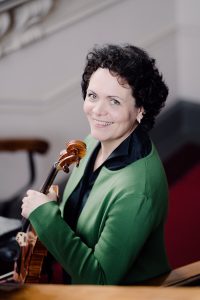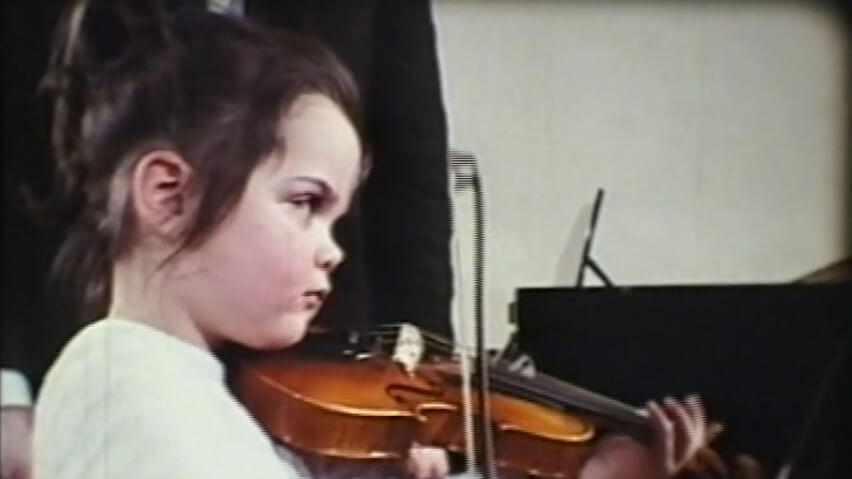Vita
Tabea Zimmermann is a musician of captivating versatility. As a soloist and chamber musician, she performs worldwide, teaches, nurtures talent and fosters collaboration. She is president of several foundations and consistently initiates ad commissions new works. While her instrument, the viola, remains central to her activities, Zimmermann’s responsibilities have grown more diverse over the years, allowing her to contribute her entire personality: with her extensive concert experience, her interest in promoting young talent, and her social responsibility. “For me, a long–standing wish is now being fulfilled: that I can help shape content,” she summarizes.
Zimmermann owes her fame to the viola. At eleven years old, Zimmermann made her debut on the stage of the Berlin Philharmonie. Competition successes in Geneva, Paris, and Budapest between 1982 and 1984 catapulted her to prominence. Shortly after, she made a distinctive move by accepting a position at the University of Music Saarland, where at 21, she became the youngest professor in Germany. Her commitment to teaching remains strong; after tenures in Frankfurt and Berlin, she returned to the Frankfurt University of Music and Performing Arts in the summer of 2023. She also shares her passion for music at the Kronberg Academy and in a few masterclasses. She maintains close ties with many of her former students, often performing alongside them.

Zimmermann’s emphasis on contemporary music was perhaps spurred by the limited traditional solo repertoire for the viola. In 1994, she premiered a solo sonata dedicated to her by György Ligeti. Composers such as Heinz Holliger, Wolfgang Rihm, and Georges Lentz wrote pieces for her. In recent times she presented solo concerti by Enno Poppe and Michael Jarrell in acclaimed CD recordings. She passionately advocates for stylistic diversity, arguing that engaging with contemporary music also influences interpretations of the classical repertoire: “It makes one interpret these pieces much more consciously.”
Quality over quantity — adhering to this principle, Zimmermann has for some time now limited her annual performances to around 50. Alongside her solo presentations, she places high importance on chamber music, collaborating with artists like Jörg Widmann, Javier Perianes, the Belcea Quartet, and long–time colleagues from the Arcanto Quartet, which existed until 2016. For Zimmermann, the attraction of small ensembles lies not just in their clarity but in their egalitarian nature — flat hierarchies that model societal interactions. She extends this approach to orchestral projects, leading symphonic pieces from her central voice, emphasizing communication and listening. She has collaborated in this manner with Ensemble Resonanz, the Bavarian Radio Symphony Orchestra, and the National Youth Orchestra of Germany.
Zimmermann remains a sought–after partner for many orchestras and festivals. She has held residencies with the Royal Concertgebouw Orchestra, the Berlin Philharmonic, and the Bavarian Radio Symphony Orchestra, to name a few. The Saint Paul Chamber Orchestra named her Artistic Partner in 2022, and she’s set to curate several concerts for the Schwetzingen SWR Festival in 2024. Her expertise is also recognized in other fields: she was president of the Beethoven–Haus Bonn for seven years and is currently the president of the Swiss Hindemith Foundation. This position reflects Zimmermann’s versatility; she has always revered Hindemith, with the recording of his complete works for viola in 2013 being a long–held desire. Now, as foundation president, she has even more opportunities to elevate the composer’s profile among musicians, promoters, and audiences. In October 2023, she was awarded honorary membership, the highest honour of the German Music Council, in tribute to her passionate and dedicated commitment to musical life.
Tabea Zimmermann will be seen more often at such crossroads between music and society. Since July 2023, she chairs the board of the Ernst von Siemens Music Foundation, which is dedicated to promoting contemporary music through an award she herself won in 2020. Zimmermann firmly believes that musicians’ roles in society need strengthening, especially after the challenges of the pandemic. Conversely, she notes, “We all need to reconsider what we hope to achieve through music.” She has also established her own foundation, named after her late first husband, David Shallon. The David Shallon Foundation supports unique, intercultural music projects such as the “Lebensmelodien” of clarinetist Nur Ben Shalom, which revives Jewish music from the Holocaust era.
For Zimmermann, it’s all about making an impact, not just in music but beyond. For her extensive contributions, she’s been honored with numerous musical awards and societal recognitions, including the Order of Merit of the Federal Republic of Germany.
This biography is to be reproduced without any changes, omissions, or additions, unless expressly authorised by the artist management.
